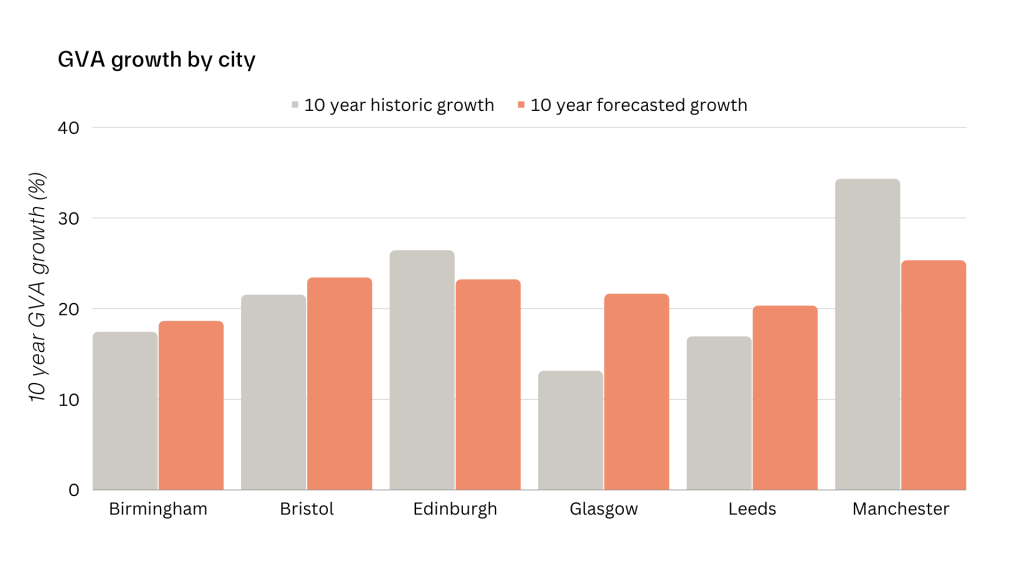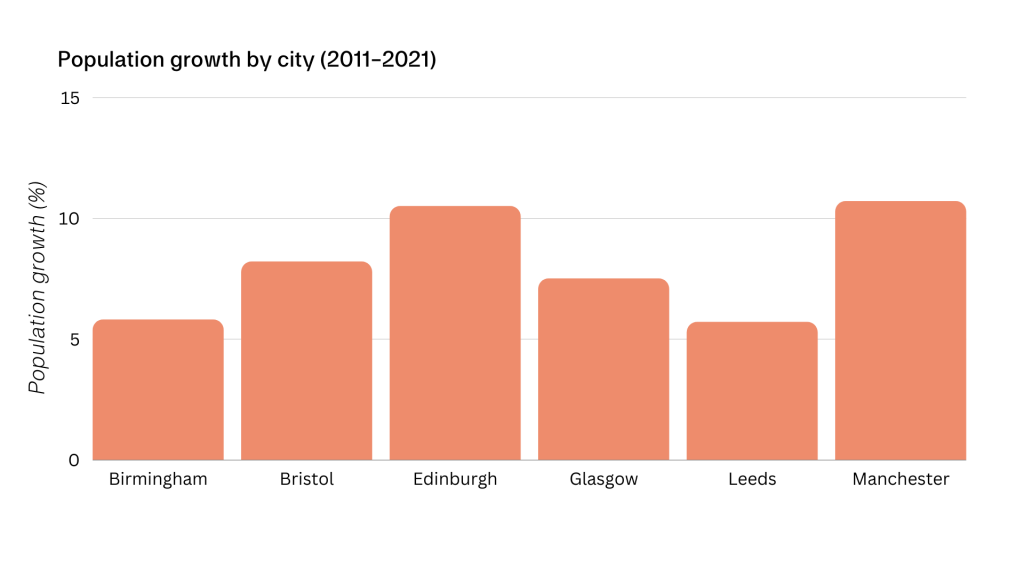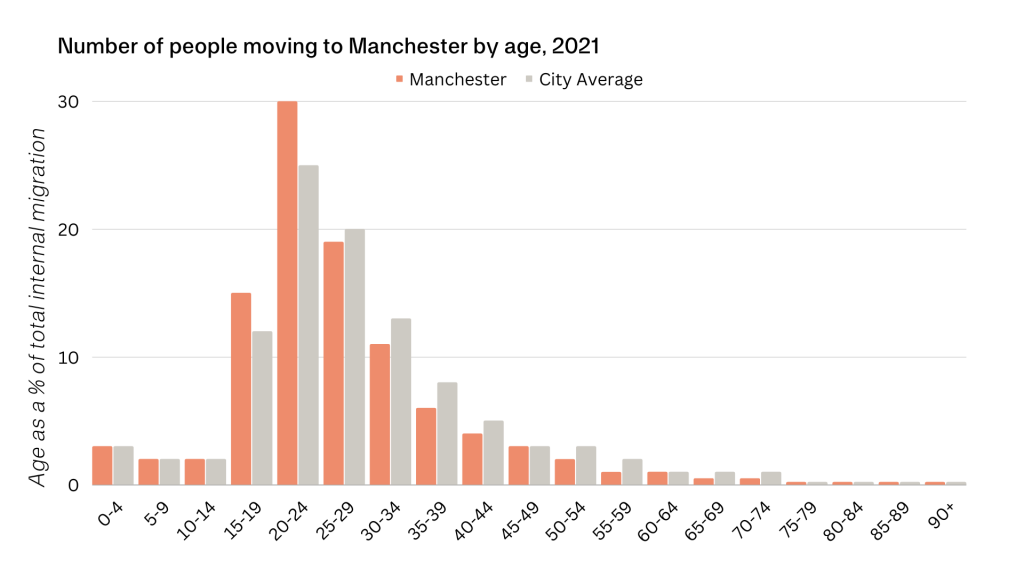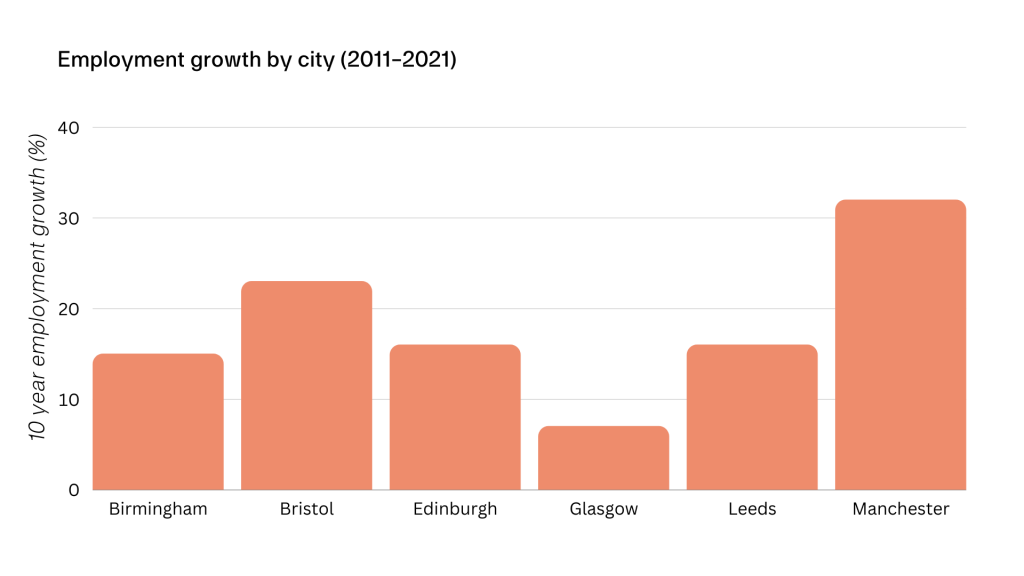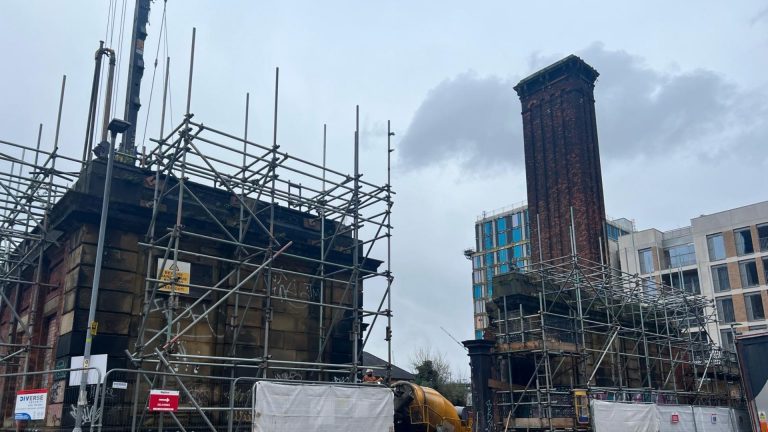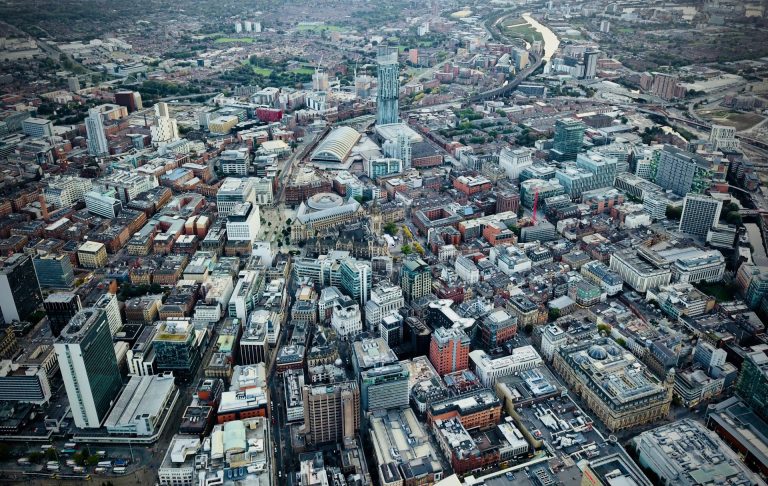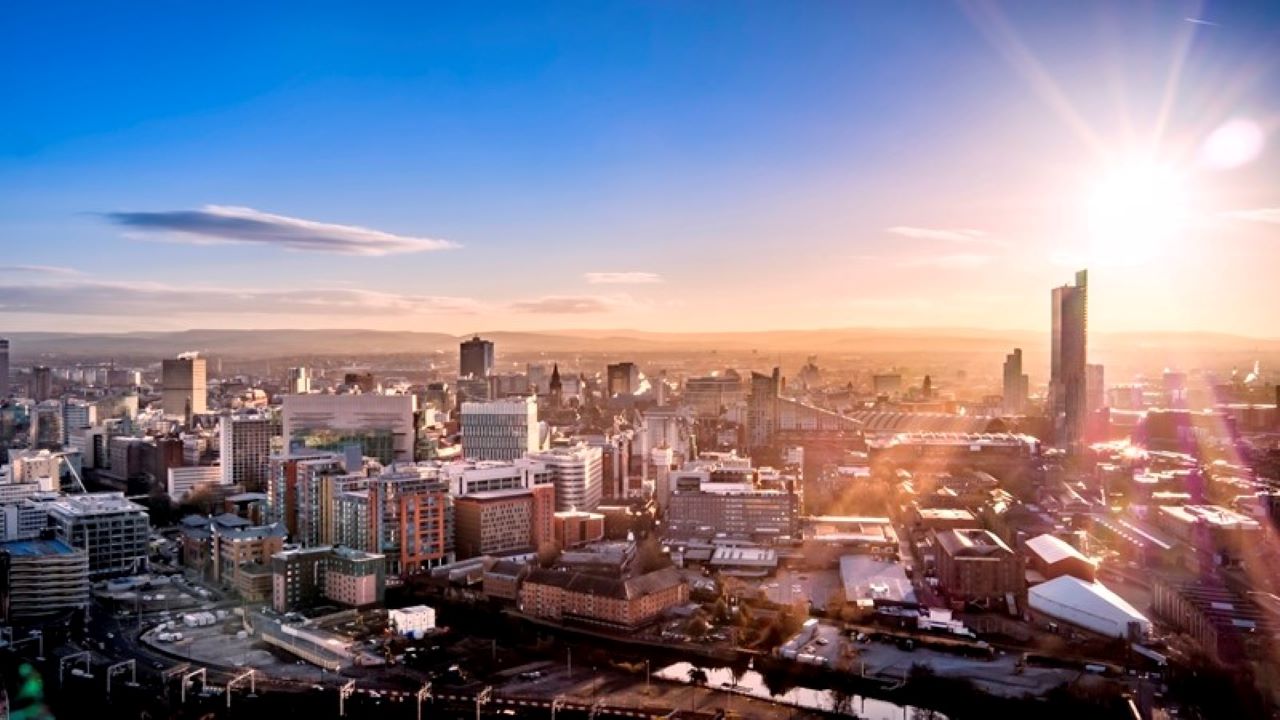News
As 2022 draws to a close, we take a look at the UK property market over the last 12 months and see how Manchester compares to Birmingham, Bristol, Edinburgh, Leeds and Glasgow (JLL’s ‘Big Six’ UK cities outside of London).
2022 has been pivotal in demonstrating the country’s recovery from the pandemic. The demand for homes across the “Big Six” cities has risen compared to 2020 and early 2021, where more households left urban areas in favour of the countryside. However, 2022 has shown that the pandemic is well and truly behind us with students and young professionals returning to the cities, causing a spike in rents and property prices alike, as demand exceeds supply within cities with growing populations.
Manchester’s property market is showing no signs of slowing down as the growing population continues to boost the economy and therefore the property market. Manchester offers both owner-occupiers and investors plenty of choices.
Looking into future projections, we dive into what this means for 2023 and beyond, taking facts and figures from the UK’s top property sources.
How is Manchester’s economy performing compared to its 5 main city-region competitors?
The Big Six were responsible for contributing a combined £15.2bn to the UK economy, with their combined economies growing 22% in the last 10 years. Manchester leads the GVA growth by city, with almost 35% 10-year historic growth, and a further 25% projected growth for the next 10 years.
Manchester’s economy is driven by high-growth modern industry sectors, having strong financial services, tech and creative businesses. This is a combination of both home-grown and high-growth businesses such as The Hut Group, UK Fast, and Boohoo, and national and international businesses relocating to the city. As recently as December 2022, Starling Bank has hailed Manchester’s “deep pool of tech talent and rich cultural and creative heritage” as key to its decision to open an office in the city and is set to create up to 1,000 jobs. This is just one recent example of many major financial services and tech businesses opening or relocating to the city.
- Not only has Manchester had the highest 10 year historic growth, it also has the highest 10 year forecasted growth of JLL’s ‘Big Six’ cities. (Source – JLL’s Big Six Residential Development Report 2022)
The city has seen large-scale investment into infrastructure such as the ongoing Metrolink expansion with over £1.5bn spent developing and expanding the tram network within the city since 2010. The government’s Northern Powerhouse rail has also recently been reaffirmed and the £39 billion investment project will improve the east-to-west travel links in the North, contributing an estimated £14.4 billion to the UK economy.
Manchester Airport is also the busiest UK airport outside of London, benefitting from the first phase of the huge £1 billion investment with the upgrade of Terminal 2 and the airport city development. The city is also awaiting the arrival of the HS2 between 2035-2040, another £44.6 billion investment which will see travel times from Manchester to London halved.
Growing population = growing demand
Manchester led the ‘Big Six’s population growth over the last 10 years with 10.7%, as people moved north away from London in search of a more affordable lifestyle in a city that still offers big city life, with a further 100,000 people predicted to move into Manchester city centre by 2025. The city saw the highest number of people moving there from elsewhere in the UK in 2021, totalling 58,800, with young professionals making up 35,000 of this figure.
- Manchester has had the highest level of population growth over the past ten years (10.7%), followed closely by Edinburgh (10.5%). (Source – JLL’s Big Six Residential Development Report 2022)
Manchester gathered many accolades in 2022, with its Northern Quarter being featured on two of Time Out’s Coolest Neighbourhood Lists – coming in at number 30 on the Top 51 Coolest Neighbourhoods In The World and number 4 on the Top 12 Coolest Neighbourhoods In The UK and it’s neighbour, Ancoats, named number 21 on the Top 33 Coolest Streets In The World. National Geographic also named it in the top 25 ‘Best of the World 2023’ list, citing the city’s art scene and famous football teams, and Lonely Planet recognised Manchester in the ‘Learn’ category of its ‘Best of Travel 2023’ list, the only UK city to feature. The thriving northern city was also named the UK’s top tech city outside of London in CBRE’s latest “UK Tech Cities Report”, retaining its position at the top following previous reports in 2017 and 2019.
It’s no surprise Manchester was also named UK’s Most Liveable City once again, according to The Economist’s Global Liveability Index 2022, making it the 28th Most Liveable City In The World, beating London by 5 places. This is an accolade the city has held each year since the Global Liveability Survey by the Economist Intelligence Unit began in 2011, where cities are ranked according to factors such as political stability, infrastructure, healthcare, graduate retention rates, and access to green space.
Manchester has the highest graduate retention rates in England, with more than 50 percent of students who study there opting to stay after they finish uni, with almost a third of people moving to Manchester from other parts of the UK aged 20-24, and young professionals aged 20-34 making up 59% of newcomers to the city annually.
- Young professionals aged 20-34 make up 59% of newcomers to the city annually. (Source – JLL’s Big Six Residential Development Report 2022)
Job opportunities continue to rise
Manchester employment has seen a 32% growth in employment over the last 10 years, almost twice nearly all the other cities. As more businesses come into the city, the demand skyrockets for people to work in industries such as tech, logistics, banking, and property amongst others, with 80 of the 100 Financial Times Stock Exchange’s companies having offices in Manchester. Manchester is also the European headquarters for companies like Brother and UAE firm Etihad Airways, and accounts for 7% of all financial services output and 10% of all employment in the UK.
Employment growth in the city is projected to be 14.7% through to 2040. This is a significantly high figure, particularly where the majority of the growth is from the professional, scientific, and technical services sectors, meaning high-value jobs created for professional workers with a significant disposal income available to spend on rent. The proportion of earnings spent on rent has been steadily declining in recent years and sits below the long-term average. The average renter spent 35% of their pre-tax income on rent in 2022, down from closer to 40% five years previously. For couples and sharers, this figure will be even lower.
- Manchester displays the highest 10-year employment growth out of the Top 6 UK Cities in the report. (Source – JLL’s Big Six Residential Development Report 2022)
How does Manchester’s House Price Growth compare to the rest of the UK?
Manchester shows great potential for house price growth as it is expected to be one of the strongest housing markets in the UK outside of London. JLL’s UK Residential Forecasts Q4 2022 reports that Manchester has the highest house price growth forecast of any UK city, with a 19.3% cumulative from 2023-2027, equalling the figure for Central London.
- (Source – JLL’s Big Six Residential Development Report 2022)
Manchester rental market shows the highest forecasted growth of any UK city in the next 5 years
Urban Bubble’s 2022 letting market report stated that Manchester’s lettings activity in 2022 was down almost a third compared to 2021, simply due to a lack of properties available to rent. The report stated that the number of properties available to rent in Manchester hit its lowest rate on record, just 360 properties across the entire city centre, during the third quarter of 2022. This caused asking rents to hit new highs during 2022, with rents achieved for new developments in the city centre increasing 18% in the summer compared with the same point a year earlier in 2021. The increased figures were partly a correction following obvious falls during 2020, but rents are still 15% higher on average than they were three years ago in 2019. The demand for new rental properties in Manchester has resulted in significant annual increases, up by 18.3% in the last 12 months.
Looking forward, JLL’s UK Residential Forecasts Q4 2022 reports that as well as the highest house price growth, Manchester also has the highest rental growth forecast of any UK city, with a 21.6% cumulative from 2023-2027. This is higher than the figure for Central London (19.9%), which means that Manchester has the highest forecast rental growth of any UK city, averaging 4% pa for the next 4 years.
- (Source – JLL’s Big Six Residential Development Report 2022)
Will Manchester continue to thrive as a top property investment hotspot in 2023?
The projections for Manchester’s future as the UK’s leading property market look strong. The Build to Rent sector is set to grow 82% in the next five years, according to global property consultancy Knight Frank, with Manchester being the most active market.
With rental stock in Manchester still in short supply and alongside this unemployment is near record lows, wage growth remains strong, and access to mortgage finance is restricting owner occupation, this outlook is supporting rental growth and price growth through competition from Manchester’s growing population of tenants for a limited supply of properties and from a growing number of investors seeking to acquire properties in the UK’s leading property market.
Find out more about Manchester’s property market in our free Manchester Investment Guide or see how we can help you meet your property investment goals by arranging a no-obligation call with one of our Property Investment Consultants.
More News
